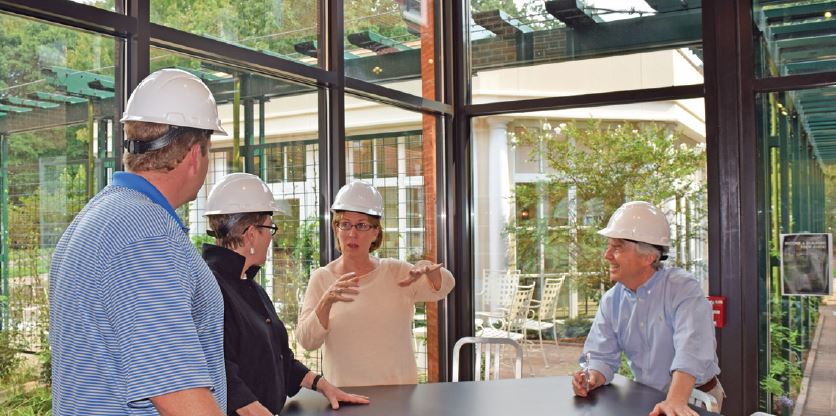A Rambling (and Cure for Insomnia) by Dennis Quaintance, CEO & CSO (Chief Storytelling Officer)
Read our Winter 2018 Neighborhood Letter
Collaboration is on my mind because I’ve been in the thick of it with even more people working on more topics and challenges than usual. The O.Henry “After 20 Years” (OH2O) hotel update project and my volunteer work with Guilford College, where I’m helping with the restoration of three residence halls and some nifty community spaces, have me realizing the value of effective collaboration more than ever. I’m also thinking about this because my friend Preston Lane, Triad Stage’s founding artistic director, who also teaches in the graduate theater program at UNCG, recently asked me to participate in a discussion about collaboration with one of his classes.
We learned at a new level that working cooperatively can cause the sum of 2+2 to be greater than 4 while we were designing the O.Henry 20 years ago. With Don Rives, then QW’s Minister of Design, as our Sherpa, we assembled an enthusiastic and competent group of specialists and artists, then united them in focus with a wellthought-out, exciting, sincere and comprehensive articulation of our intention. The last line of our intention went: “When our guests check out, we want them to say, ‘I would rather get a change of address card and live here, but I really must go’.”

Guilford College President Jane Fernandes with Nancy & Dennis and facilities head Brett Hacker collaborating in the student demonstration kitchen of the recently restored Binford Hall at Guilford.
With this OH2O effort, we’ve assembled mostly the same team as two decades ago, and we are employing the same collaborative methods: A Clearly Stated Intention, Trust, Genuine Commitment, Embracing Purpose-Driven Non-Mean-Spirited Conflict, Regular Meetings, Competent Facilitation and, most importantly, having participants who are good at modifying their knee-jerk reactions and behaviors to serve the agreed-up Purpose of the Effort. That last point leads to the meat of this Rambling, which is that the ability to connect behaviors to intentions is central to being an effective collaborator. This past spring, I was honored to give the commencement talk at Guilford College, and I rattled on about just this topic. Following are my notes from that talk, which I’m sharing here as Part 1 of this Collaboration Rambling. In Part 2 next spring, I’ll share some fun stories about…
“Guilford Talk: Rather than stand up here and talk at you, I’d prefer to get out for a walk with each of you, one on one. Since that isn’t in the cards, let’s pretend. Let’s imagine that we’ve been out walking and shooting the breeze for a couple of hours, enjoying getting to know one another and taking in the warm beauty of nature. About 15 minutes before we need to return to base camp, you say, “I feel really good about the core values that I’ve settled on for myself. I am confident that if I stick with them, they will help me experience the various dimensions of my life consistent with my intentions. I know who I am and where I stand. What I’m not so sure about is how to get better at bringing my grounding points to life in my day-to-day life — especially as I leave Guilford. Moving on to the next chapter of my adventure has me wondering if — with the pressures of life — I might wake up years from now and realize that I didn’t get near as much of the rubber of my values to the road of my life as I’d intended. Do you have any ideas about how I might get even better at operationalizing my values?”
I’m pretty sure I’d say, “Well, friend, that’s a mouthful … I sort of wish you’d brought this up a few miles back. It takes courage and method to live an examined life. This is the sort of topic that seems to be addressed more often later in life with regrets rather than sooner with aspirations. It sounds like you chose the trail less hiked. I agree that life is too short to just go with the flow, so, sure, why not, I’ll share some ideas.”
Before I do, here are some qualifiers. Please do not hear me saying you “should” do this or that. Nancy, my wonderful bride and colleague, and I have an agreement not to “should” on one another. I do not want to “should” on you. Instead, please hear me saying, “If I were you, I might consider…” not “You should.” Also, please do not hear me saying that I’m a good practitioner of the things I’ll mention. I’m a work in progress. And I didn’t invent any of this. I learned this stuff growing up in Western Montana from my mom and my siblings, my friends, my mentors, by reading, by traveling, by hanging out with people different from me and from my mistakes. (Mistakes are helpful. Good judgment comes from experience, and a lot of experience comes from bad judgment!)
With that context, here is some grist for your mill: Consider pretending that your mind and body are your instruments and that you are your intentions. Sounds easy. It isn’t. Neither is it impossible.
Here’s how I approach this: I imagine that the real “me” is an even smaller person who floats off to my right. My “me,” in essence, is my intentions. My imagination brings this playful, firm yet fair character to life. My “me” holds my values and gives “this instrument” instructions and feedback. The information is seldom complicated, wordy or mean-spirited, yet sometimes my “me” understandably gets a bit exasperated. This model only works if your intentions (values) are fully considered and concise. Consider boiling your values down to their essence so that they can be easily referenced where we really live our lives: in those brief moments between a stimulation and our response. Once you have it distilled to a few key words, you can then support those ideas with hundreds of behaviors that can be nurtured into habits that can bring to life your ideas for your life. Don’t settle for the simplicity on the near side of the complexity. Seek the simplicity on the far side. Friend, go deep.
Nancy and I have our core values whittled down to three foundational words and one footnote: Love, Compassion and Service … Without the pat-a-cake malarkey that often comes with those sorts of ideas. I sure wish I was better at really getting these ideas to my processing unit and data output center (Hear: brain and mouth) prior to some of my responses. If you have this same challenge, get good at apologizing and asking for “do-overs.”
Next: I think we all intrinsically know that all we ever really possess is the moment that we happen to be in. The now, the now, the now… We cannot operationalize our values, much less experience joy, tranquility or enthusiasm, tomorrow or yesterday — only in the moment we are experiencing. Consider getting even better at being here, now. How? Meditate, absorb nature, get enough sleep, eat well, move your body, develop trusted and trusting friends and have reminder mechanisms to bring your attention back to the here and now. One is as simple as giving your attention to your breathing.
Next: Remember that you really only hold a value if you are willing to voluntarily inconvenience yourself in service of it. If we don’t do that, we don’t have values, we have delusion and hypocrisy.
Next: Get good at being mindful. Learn at the next level to see your ego, your pride, your intellect, your predispositions, your pain, your fears and your insecurities for what they are, not who you are. Egos are particularly tricky. We all have them, they are powerful, they love being right, hate being wrong and have sneaky ways of rationalizing getting to “I am right.”
Having my “me” around to notice these sorts of distractions is helpful. When I’m mindful enough to give my “me” space, I might hear things such as, “I notice that you are bit puffed up,” or, “I notice that you are anxious and fearful,” or, “Little ticked off, are you?” Then something like, “What is, is. You feel how you feel. Please be OK with that, you silly bumpkin. You have a right to any emotion that comes your way. There are no inappropriate emotions … yet there are inappropriate behaviors that often seem natural and justified with many emotions – so be careful. Now, my wonderful, lovable flawed instrument, please figure out the optimal behaviors to make real our intention of being loving, compassionate and ‘of service’.”
Next: Involve yourself with organizations whose values are simpatico with your own. This is important. Context is huge. You can’t swim in sand. If you want to swim, get in water. You’ll seldom get a 100 percent fit. If you get above an 85 percent crossover in values, you ought to be able to experience yourself as consistent with your values. By the way, Guilford’s values give me energy. I’ve been drawn to this place for nearly 40 years, not just because of the amazing people and its beauty, but mostly because of the values that are brought to life here.
Next: Get even better at collaborating. Real collaboration is really fun and really hard. Collaboration is at the core of any effective organization. I suggest starting collaborative processes by getting to consensus on the intention — and always have the intention align with the organization’s mission, purpose and values — then focus more on the process than outcome. If we focus on outcome, we’ll only go where we have already been. If we focus on process, we might end up in a lovely place that we’d never have found otherwise.
We are nearly back to base camp, so quick-like I’ll share just a few more ideas: Every person and organization, since organizations are made up of people, will not connect their behaviors to their intentions all the time. Let’s give ourselves, and others, space to make mistakes and not dwell on them. Instead, notice trends.
Your question about how to operationalize your values is a great one. I think that frequently addressing that question yourself would surely be more helpful than anything I’ve shared.
Last: It is my observation that to some degree we all sort of become our dominant thoughts. Be careful what you think and dream! For better or for worse, you might just create the life you imagine. It seems like the key is to connect our behaviors to our intentions, even when we don’t feel like it — to sort of put our intentions in front of ourselves. I hope you find what is authentic for you. Let’s not just be alive, let’s be awake.
Well, we are back to our base camp. We can drop the pretend walk game now. Thank you for sharing part of your day with me. I know what: Let’s become the change we want to see in the world! Peace. Love. Rock on!”
P.S. I shared a draft of this rambling with Chip Holton, my friend and QW’s Artist-in-Residence. Here is what he wrote back, “Core is awareness. We are all drops of thought in an ocean of knowing. Together we sail. What else do we need?” In a good way, Chip ain’t normal.

Copyright 2018 Dennis W. Quaintance, used with permission
Neighborhood Letter, Winter • TM & © 2018 Quaintance-Weaver and affiliated entities
Print PDF
